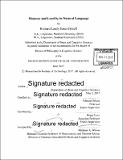Memory and locality in natural language
Author(s)
Futrell, Richard Landy Jones
DownloadFull printable version (16.94Mb)
Other Contributors
Massachusetts Institute of Technology. Department of Brain and Cognitive Sciences.
Advisor
Edward Gibson and Roger Levy.
Terms of use
Metadata
Show full item recordAbstract
I explore the hypothesis that the universal properties of human languages can be explained in terms of efficient communication given fixed human information processing constraints. I argue that under short-term memory constraints, optimal languages should exhibit information locality: words that depend on each other, both in their interpretation and in their statistical distribution, should be close to each other in linear order. The informationtheoretic approach to natural language motivates a study of quantitative syntax in Chapter 2, focusing on word order flexibility. In Chapter 3, I show comprehensive corpus evidence from over 40 languages that word order in grammar and usage is shaped by working memory constraints in the form of dependency locality: a pressure for syntactically linked words to be close. In Chapter 4, I develop a new formal model of language processing cost, called noisy-context surprisal, based on rational inference over noisy memory representations. This model unifies surprisal and memory effects and derives dependency locality effects as a subset of information locality effects. I show that the new processing model also resolves a long-standing paradox in the psycholinguistic literature, structural forgetting, where the effects of memory appear to be language-dependent. In the conclusion I discuss connections to probabilistic grammars, endocentricity, duality of patterning, incremental planning, and deep reinforcement learning.
Description
Thesis: Ph. D. in Cognitive Science, Massachusetts Institute of Technology, Department of Brain and Cognitive Sciences, 2017. Cataloged from PDF version of thesis. Includes bibliographical references (pages 189-211).
Date issued
2017Department
Massachusetts Institute of Technology. Department of Brain and Cognitive SciencesPublisher
Massachusetts Institute of Technology
Keywords
Brain and Cognitive Sciences.